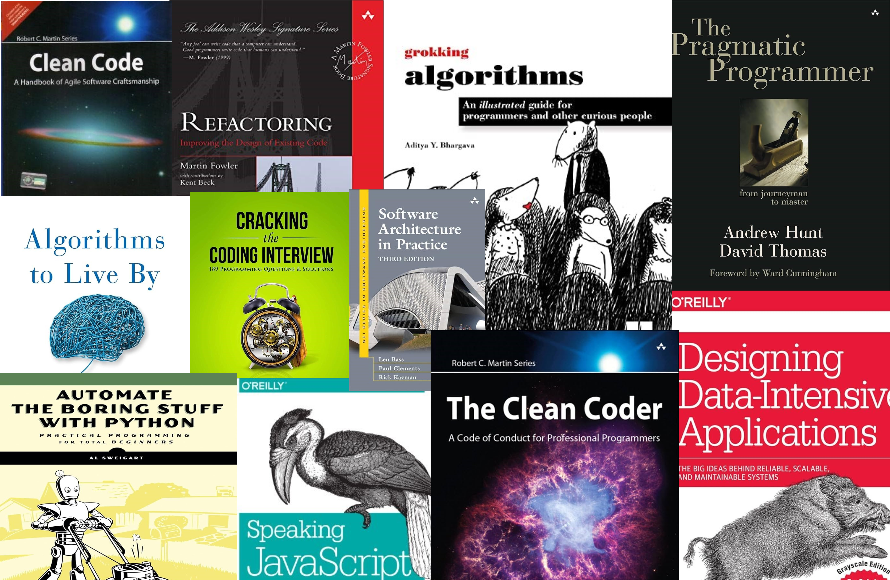10 Crucial Software Development Books You Should Read and Learn From | 2024
 SADIQ HUSSAIN
SADIQ HUSSAIN
As a software developer, continuous learning is key to staying ahead in the ever-evolving tech landscape. Over the past year, I've embarked on a journey to deepen my knowledge by reading and applying insights from ten essential software development books. Here, I’ll share my experience and the practical lessons I’ve integrated into my daily workflow.
1. Cracking the Coding Interview by Gayle Laakmann McDowell
This book is a treasure trove of coding interview questions and strategies. Through it, I’ve honed my skills by regularly solving algorithm and data structure problems. This practice has sharpened my coding abilities and boosted my confidence. Developing effective strategies for different types of coding interview questions has also become second nature. Additionally, I’ve found great value in conducting mock interviews, which has significantly improved my performance under pressure.
2. Clean Code & The Clean Coder by Robert C. Martin
Robert C. Martin, also known as Uncle Bob, provides invaluable insights into writing clean, maintainable code and the professional aspects of being a software developer. From these books, I’ve learned to give variables, functions, and classes names that clearly reflect their purpose, which has improved the readability of my code. Embracing the Single Responsibility Principle (SRP) has enhanced my code structure by ensuring that each class and function has only one responsibility. Regularly refactoring code to improve readability and reduce complexity has become a part of my routine. Additionally, I’ve adopted a professional attitude towards coding, which includes writing tests and maintaining code quality, estimating tasks better, managing my time effectively, and improving communication with stakeholders and team members to ensure clarity and alignment on project goals.
Check out book link(Clean Code)↗
Check out book link(Clean Coder)↗
3. The Pragmatic Programmer by David Thomas and Andrew Hunt
This book is filled with practical advice and anecdotes that make complex concepts easy to understand. Inspired by it, I’ve minimized code duplication by creating reusable functions and modules, adhering to the DRY (Don't Repeat Yourself) principle. Keeping code components independent and decoupled has made my systems more robust and easier to test, embodying the principle of Orthogonality. Furthermore, the book has motivated me to continually learn new programming languages and tools to expand my skill set.
4. Automate the Boring Stuff with Python by Al Sweigart
A practical guide to automating repetitive tasks using Python, this book has taught me to write scripts for tasks like data entry, file manipulation, and web scraping. Utilizing libraries like pandas, openpyxl, and beautifulsoup has allowed me to handle various automation tasks efficiently. This has significantly reduced manual effort and increased efficiency in my daily workflows.
5. Refactoring by Martin Fowler
This comprehensive guide to improving existing codebases without changing their behavior has been a game-changer. I’ve become adept at identifying and addressing code smells to maintain a clean codebase. Using refactoring techniques such as extracting methods, renaming variables, and simplifying conditional expressions has greatly improved the readability and maintainability of my code. Embracing Test-Driven Development (TDD) has further ensured code reliability and facilitated safe refactoring.
6. Designing Data-Intensive Applications by Martin Kleppmann
This deep dive into building reliable, scalable, and maintainable data systems has expanded my understanding of different data models and their use cases, helping me choose the right tools for various jobs. Implementing strategies for data consistency and replication in distributed systems has become a key part of my skill set. Additionally, leveraging stream processing for real-time data analysis and processing has opened new avenues for handling data.
7. Speaking JavaScript by Dr. Axel Rauschmayer
Dr. Axel Rauschmayer’s deep dive into JavaScript has provided me with a thorough understanding of the language’s intricacies. Gaining a deeper understanding of core concepts such as closures, prototypes, and asynchronous programming has been invaluable. I’ve leveraged modern JavaScript features like ES6+ syntax, modules, and async/await to write cleaner and more efficient code. Incorporating functional programming techniques has further improved code readability and maintainability.
8. Algorithms to Live By by Brian Christian and Tom Griffiths
This book explores how algorithms can be applied to everyday life decisions. I’ve applied the optimal stopping theory to make better decisions in hiring and personal life. Balancing the exploration of new opportunities with the exploitation of known resources, as discussed in the book, has helped in project management. Additionally, applying efficient sorting and searching techniques has been beneficial in both code and life organization.
9. Grokking Algorithms by Aditya Y. Bhargava
The visual approach to explaining algorithms in this book made complex concepts more accessible. I’ve gained a solid understanding of data structures like trees, graphs, and heaps, which has improved my problem-solving skills. Being more conscious of the time and space complexity of my code has led me to strive for efficient solutions consistently.
10. Software Architecture in Practice by Len Bass, Paul Clements, and Rick Kazman
This book provides a solid foundation in software architecture principles. Applying architectural patterns like microservices, layered architecture, and event-driven architecture in projects has been transformative. Ensuring that systems meet quality attributes such as scalability, security, and performance has become a key focus. Additionally, documenting architectural decisions and designs has improved communication and provided valuable references for future work.
These ten books have profoundly influenced my approach to software development, providing me with a wealth of knowledge and practical lessons that have significantly enhanced my skills and workflow.
Are there any other essential books you think should be added to this list?
Follow me on LinkedIn↗
Subscribe to my newsletter
Read articles from SADIQ HUSSAIN directly inside your inbox. Subscribe to the newsletter, and don't miss out.
Written by

SADIQ HUSSAIN
SADIQ HUSSAIN
I create user-friendly interfaces for complex algorithms.